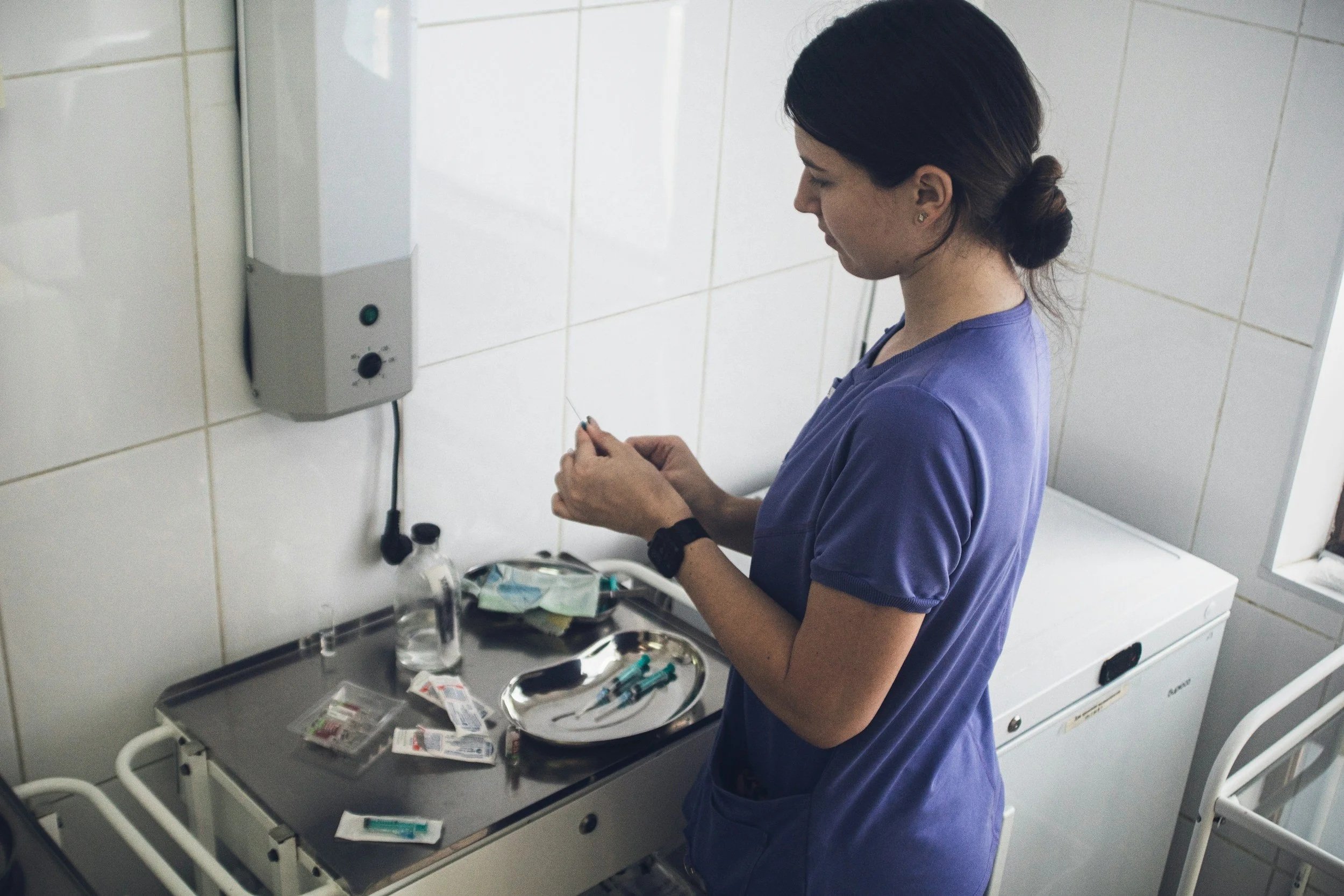If you’re considering egg freezing, one of the first questions you might have is: How does this process line up with my menstrual cycle? While there is a typical timeline, it’s more flexible than you might think.
In most cases, ovarian stimulation begins at the start of your period. This phase usually lasts about two weeks, during which you’ll take hormone injections to help your ovaries produce multiple eggs. Your fertility clinic will monitor your progress with ultrasounds and blood tests, and once your eggs are ready, they’ll be retrieved in a short outpatient procedure.
What if my ideal timing for a retrieval doesn’t line up with my period?
Life doesn’t always follow a perfect calendar and thankfully, neither does egg freezing. If you have travel plans, a busy work schedule, or just need a little more time to prepare, your cycle can be adjusted using medications like birth control pills.
Patients will typically take these pills for a short period of time (often less than a month), then stop them when they’re ready for the stimulation phase. It’s quite predictable that a patient will get their period within a few days of stopping, allowing for better control of when the process begins. In other words, birth control shifts your cycle to fit your schedule.
Can this be done without birth control pills?
Estrogen alone or progesterone alone can also be used for scheduling purposes, There’s also a lesser-known option called a random start protocol, which allows stimulation to begin at any point in your cycle, not just during your period. This approach was originally developed for patients who needed to preserve fertility quickly before starting treatments like chemotherapy. Today, it’s used for anyone who needs a more flexible timeline. Random start protocols may involve slightly longer stimulation periods or higher doses of medications, but they’re completely safe. Studies have shown that random start protocols can yield results just as good as traditional timing.
Are there any downsides to a random start protocol?
While outcomes are comparable to standard protocols, there’s one key consideration: timing for an embryo transfer. Eggs (and embryos, if chosen) retrieved from random start cycles are generally frozen rather than transferred immediately. The lining of the uterus is not necessarily synchronized for implantation at this point. When you’re ready to pursue pregnancy, your doctor can time the transfer to ensure the uterine lining is optimized for implantation and pregnancy success.
The bottom line
Whether you’re planning ahead or facing a time-sensitive situation, egg freezing can be personalized for your schedule. Your fertility team will work with you to choose the best protocol based on your health, goals, and timing needs.
Egg freezing is a big decision but understanding how it fits into your cycle can make it feel a little more manageable. With options like birth control scheduling and random start protocols, you don’t have to wait for the “perfect” moment because the process can be tailored to meet you where you are.

Dr. Ido Feferkorn is a reproductive endocrinologist at Reproductive Medicine Group in Tampa. He specializes in treating patients with infertility, PCOS, endometriosis and recurrent pregnancy loss. He also has a special interest in fertility preservation. Dr. Feferkorn’s research has been presented in international conferences such as the American Society for Reproductive Medicine (ASRM) and European Society for Human Reproduction and Embryology (ESHRE). Dr. Feferkorn loves spending his free time with his wife and three kids. He chose REI because of the magic in seeing life created and accompanying the journey to parenthood.
Learn more about Reproductive Medicine Group’s egg freezing practice on Freeze.
Answered by Dr. Roy Handelsman from HRC Fertility. Understand how ovarian cysts and ovarian surgery may impact the egg freezing process.
Answered by Dr. Rashmi Kudesia from CCRM Fertility Houston. Here’s a checklist for before, during, and after your egg freezing consultation, including 11 questions you should ask the doctor.
Answered by Valerie Shafran, MSN, FNP-C from Extend Fertility. Discover why fertility experts urge women to stop taking GLP-1 agonists before an egg freezing cycle.
Answered by Dr. Nidhee Sachdev from South Coast Fertility Specialists. Explore what AMH tells us about a woman’s ovarian reserve or how many eggs she has left.
Answered by Dr. Hade from Generation Next Fertility. Understand how egg freezing does not cause long-term weight gain yet there is a chance of transient bloating.
Answered by Rijon Charne, JD from Sunray Fertility. Explore what a reproductive estate plan entails and the situations where having one can make a big difference.
Answered by Rijon Charne, JD from Sunray Fertility. Learn more about the importance of clinic disposition forms, including what they do and don’t cover.
Answered by Rijon Charne, JD from Sunray Fertility. Discover the legal nuances that can shape your options when freezing eggs or embryos.
Answered by Dr. Joshua Klein from Extend Fertility. Learn how birth control relates to egg freezing and if you will need to stop your hormonal birth control before starting the procedure.
Answered by Dr. Jesse Hade from Generation Next Fertility. Discover the important factors that affect chances of egg freezing success in your late thirties.
Answered by Sidonia Buchtova, PA-C, C-RHI from Refresh Psychiatry. Understand if you can stay on an SSRI or SNRI when freezing your eggs.
Answered by Sidonia Buchtova, PA-C, C-RHI from Refresh Psychiatry. Discover tips to help support your mental well-being during preparation, throughout the cycle, and after your egg retrieval, especially if you have a history of anxiety.
Answered by Dr. Katharina Spies from Vida Fertility. Learn about who should consider supplements before and during fertility preservation, and how supplements could support your egg freezing cycle.
Answered by Dr. Serin Seckin from Generation Next Fertility. Understand the key differences to help you make an informed decision that aligns with your personal and reproductive goals.
Answered by Dr. Ido Feferkorn from the Reproductive Medicine Group. Learn how Polycystic Ovarian Syndrome (PCOS) may affect the egg freezing process and outcomes of fertility preservation.
Answered by Dr. Meera Shah from Nova IVF. Understand the potential risks of egg freezing to help you evaluate if it is right for you.
Answered by Dr. Hade from Generation Next Fertility. Learn from start to finish the entire process of what happens on the final day of an egg freezing cycle.
Answered by Dr. Sahar M. Stephens from Northern California Fertility Medical Center. Understand the probability of pregnancy based on the number of eggs frozen and the age at which you freeze.
Answered by Dr. Alison Peck from HRC Fertility. Discover which medications are commonly used for ovarian stimulation during an egg freezing cycle.
Answered by Dr. Kathryn Snow from Piedmont Reproductive Endocrinology Group (PREG). Understand the side effects that you may experience when freezing your eggs.
Answered by Lia Schiller, MSN, AGNP-BC from Extend Fertility. Learn why IUDs can stay in place throughout the egg freezing process.
Answered by Dr. Woo from HRC Fertility. Learn how some medications need to be stopped for an egg freezing cycle while some medications can be continued.
Answered by Dr. Dan Nayot from The Fertility Partners. Learn how artificial intelligence is providing women with more information than ever before about their eggs.
Answered by Dr. Joshua Klein from Extend Fertility. Egg freezing doesn’t impact your chance of getting pregnant naturally, because egg freezing makes use of eggs that would otherwise have been lost.
Answered by Dr. Dan Nayot from The Fertility Partners. Understand the distinction between egg quantity and quality, and explore how AI is transforming egg quality analysis.
Answered by Dr. David E. Tourgeman from HRC Fertility. Understand what options exist for what to do with your frozen eggs if you decide not to use them for IVF.
Answered by Dr. Armando Hernandez-Rey from Conceptions Florida. Learn about minimal stimulation egg freezing cycles and how they can decrease the risk of ovarian hyperstimulation syndrome.
Answered by Dr. Ido Feferkorn from the Reproductive Medicine Group. Find out how egg freezing medications work and how protocols can be adjusted if you can’t take estrogen.
Answered by Dr. Ido Feferkorn from Reproductive Medicine Group. Learn how egg freezing fits into the menstrual cycle and how timing can be customized.
Answered by Dr. Elena Santiago from Vida Fertility. Understand the ins and outs of egg freezing in Spain as a non-resident, including timing, costs, and more.






























